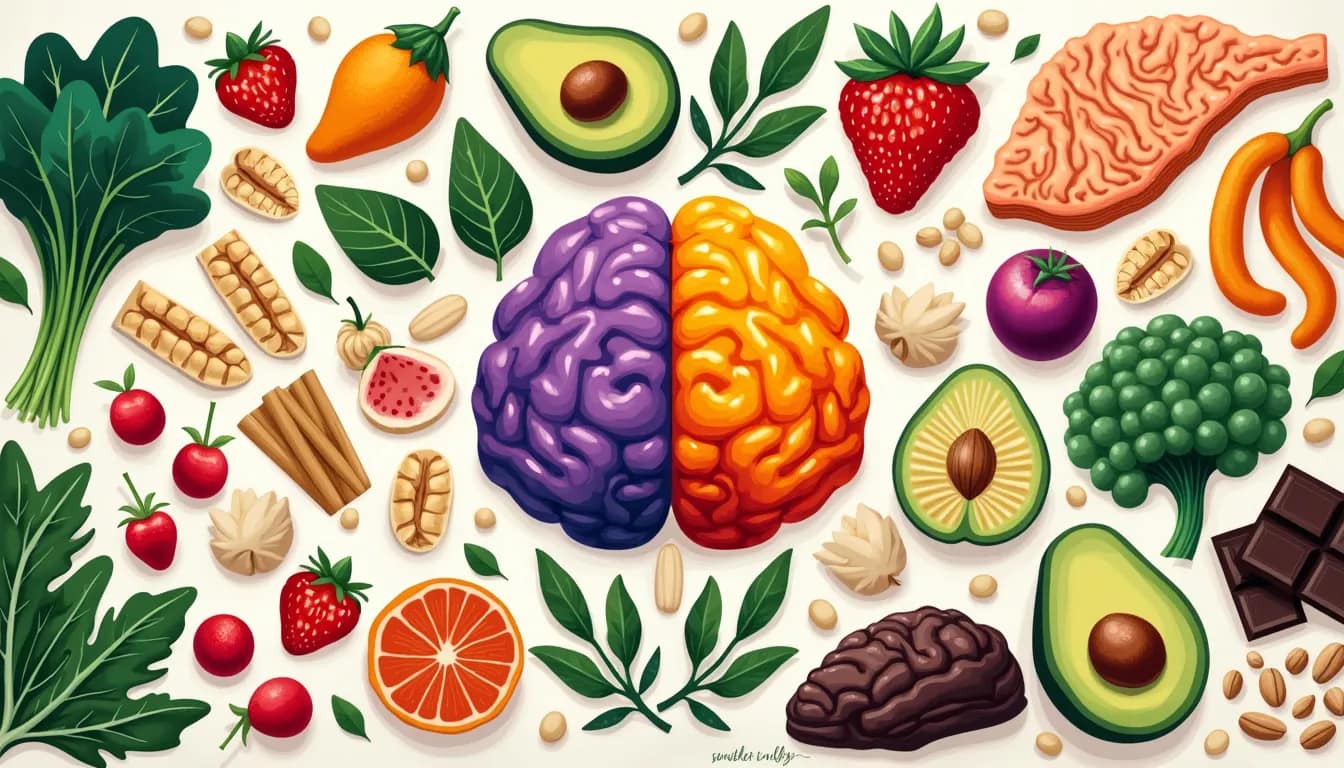In today’s fast-paced world, mental clarity is more crucial than ever. The ability to think clearly, to focus, and to process information efficiently forms the bedrock of our daily functionality and overall well-being. But did you know that the way to a sharper mind could be through your stomach? The connection between what we eat and how our brain performs is profound and backed by growing scientific evidence. Our diet can either be a powerful ally, enhancing our cognitive abilities, or a silent saboteur, clouding our mental faculties.
Nutrition plays an indispensable role in maintaining and boosting mental clarity. The foods we consume provide the essential nutrients that our brain needs to function optimally. Just like a car needs the right fuel to run smoothly, our brain requires specific nutrients to maintain its efficiency and sharpness. By understanding and harnessing the power of these nutrients, we can pave the way for better focus, improved memory, and enhanced cognitive function.
In this article, we will explore some of the key nutrients that play a pivotal role in promoting mental clarity. From the brain-boosting benefits of Omega-3 fatty acids to the antioxidant properties of Vitamins C and E that combat oxidative stress, we will delve into how each of these nutrients supports our mental health. We’ll also look at the impact of B-vitamins on neurotransmitter production and the importance of minerals like magnesium and zinc in optimizing our brain performance.
Beyond identifying these crucial nutrients, we’ll share practical dietary strategies to help you integrate brain-boosting foods into your daily routine. Discover how incorporating a balanced diet, staying hydrated, and complementing these efforts with a healthy lifestyle can significantly reduce mental fog and enhance your cognitive clarity. With actionable tips and insights, making conscious dietary choices can become a seamless part of your journey towards better mental clarity.
Introduction to Nutrition and Mental Clarity
Understanding the link between what we eat and how our brain functions can be a profound realization. When we think about mental clarity, we often consider things like stress, sleep, and exercise. Yet, nutrition plays a fundamental role.
Nourishing our bodies with the right foods isn’t just about physical health—it’s about nurturing our minds too. Imagine your brain like an engine that needs high-quality fuel to run efficiently. Eating a well-balanced diet significantly contributes to our ability to think clearly, maintain focus, and process information effectively.
The Connection Between Diet and Brain Function
Research has consistently shown that what we eat directly affects our brain’s structure and functionality. Diets high in refined sugars and unhealthy fats have been linked to impaired brain function and can negatively impact our mental clarity. Conversely, consuming nutrient-rich foods can enhance cognitive processes and improve mood.
If you’ve ever felt sluggish or had difficulty focusing after a meal heavy in processed foods, that’s your brain responding to what you’ve consumed. In contrast, meals rich in essential nutrients provide stable energy and support cognitive function, helping you remain alert and clear-headed through your day.
Importance of Mental Clarity for Overall Well-Being
Mental clarity isn’t just a bonus—it’s a cornerstone of overall well-being. Clear thinking and sharp focus allow us to efficiently tackle daily tasks, make informed decisions, and engage fully in our personal and professional lives. When our mind is cluttered or foggy, it can lead to stress, decreased productivity, and even mental health issues such as anxiety or depression.
By prioritizing mental clarity through mindful eating, we create a foundation for a more peaceful, balanced, and fulfilling life. It’s about tapping into the potential of your mind through the simple, everyday choices you make at the dining table.
Overview of Key Nutrients That Impact Cognitive Function
To maintain optimal brain health, certain key nutrients play a crucial role. Let’s explore some of these essential components and how they contribute to mental clarity:
- Omega-3 Fatty Acids: These are critical for brain health and function. They support cell membranes and play a pivotal role in cognitive processes. Regular consumption of omega-3s has been linked to improved mental performance and reduced cognitive decline.
- Antioxidants: Vitamins C and E are powerful antioxidants that protect brain cells from oxidative stress. This helps maintain cognitive health and reduce the risk of neurodegenerative diseases.
- B-Vitamins: These vitamins, including B6, B9 (folic acid), and B12, are essential for brain function. They support energy production, the formation of neurotransmitters, and help reduce homocysteine levels, which, when elevated, can lead to cognitive impairment.
- Minerals: Elements like magnesium and zinc are vital for numerous brain functions. Magnesium is integral to nerve transmission and neuromuscular conduction, while zinc contributes to neurotransmitter function and improved communication between brain cells.
2. Key Nutrients for Enhancing Mental Clarity
Our daily diet plays a crucial role in shaping our mental clarity and cognitive health. Here, we will explore some key nutrients known to boost brain function, helping you to feel sharper and more focused.
The Role of Omega-3 Fatty Acids in Cognitive Health
Omega-3 fatty acids are essential fats that our bodies cannot produce on their own. They play a vital role in brain function and development. Studies have shown that Omega-3s are integral in maintaining the structure of brain cells, particularly in areas related to learning and memory.
Consider incorporating Omega-3 rich foods into your diet, such as fatty fish (salmon, sardines), flaxseeds, chia seeds, and walnuts. These sources not only support brain health but also provide a myriad of other health benefits.
Benefits of Antioxidants in Reducing Oxidative Stress
Antioxidants, including Vitamins C and E, combat oxidative stress, which is an imbalance between free radicals and antioxidants in the body. Oxidative stress can damage brain cells and impair cognitive function over time.
Vitamin C, found in abundance in citrus fruits, strawberries, bell peppers, and broccoli, can support the immune system and promote a healthy brain. Similarly, Vitamin E, present in nuts, seeds, and leafy green vegetables, helps protect brain cells from oxidative damage.
Impact of B-Vitamins on Brain Health and Neurotransmitter Production
B-Vitamins, particularly B6, B12, and Folate, are essential for brain health and neurotransmitter production, which are chemicals that transmit signals in the brain. These vitamins are involved in energy production and maintaining cognitive functions.
Ensure a good intake of B-Vitamins by eating a balanced diet that includes whole grains, lean proteins, and a variety of fruits and vegetables. Eggs, dairy products, legumes, and fortified cereals are excellent sources of these vital nutrients.
Influence of Minerals Like Magnesium and Zinc on Mental Performance
Minerals such as magnesium and zinc also contribute significantly to mental clarity and cognitive performance. Magnesium plays a role in over 300 biochemical reactions in the body, including brain function. It helps manage stress and enhances learning and memory.
Rich sources of magnesium include spinach, almonds, avocados, and dark chocolate. Zinc, on the other hand, is vital for brain signaling and neurotransmitter function. Foods rich in zinc include shellfish, meat, pumpkin seeds, and chickpeas.
Mindfully choosing to include these nutrients in your diet can make a substantial difference in how clearly and effectively you think and feel throughout the day. Reflecting on the foods you eat and their benefits can be a deeply reassuring practice, bringing you closer to a balanced, healthy lifestyle.
Interactive Element: Take a moment to reflect on your daily diet. Are there any changes you could make to incorporate more of these brain-boosting nutrients? Write down a simple plan or a few new foods to try this week.
By nourishing your body with these essential nutrients, you’re taking a significant step toward enhancing your mental clarity and overall well-being.
Dietary Strategies for Promoting Mental Clarity
Diet plays a pivotal role in boosting mental clarity. Our daily food choices can significantly influence how sharp and focused we feel. Here are some practical strategies to help you harness the power of nutrition for enhanced cognitive function.
Examples of Brain-Boosting Foods
There’s a rich variety of foods that support brain health. Incorporating these into your diet can help sustain mental clarity:
- Fatty Fish: Salmon, mackerel, and sardines are high in Omega-3 fatty acids, which are essential for brain function and development.
- Nuts and Seeds: Foods like walnuts, flaxseeds, and chia seeds provide healthy fats and antioxidants that support cognitive health.
- Leafy Greens: Vegetables such as spinach, kale, and broccoli are packed with vitamins and antioxidants that help protect the brain from oxidative stress.
- Berries: Blueberries, strawberries, and other berries are rich in antioxidants and have been shown to improve brain function and delay brain aging.
The Importance of a Balanced Diet and Hydration
A balanced diet ensures your brain receives the full range of nutrients it needs to function optimally. Combining different food groups and maintaining variety in your meals can keep your brain fueled and focused. Here are some tips:
- Whole Grains: Incorporate whole grains like oats, brown rice, and quinoa into your diet to provide a steady release of energy, keeping you alert and mentally active.
- Lean Proteins: Chicken, turkey, beans, and tofu are excellent sources of protein, crucial for neurotransmitter production and brain cell rejuvenation.
- Hydration: Keeping your body well-hydrated is crucial for maintaining mental clarity. Aim for at least eight glasses of water daily. Dehydration can lead to fatigue and impair cognitive functions.
Lifestyle Practices That Complement Nutritional Efforts
Nutrition is a vital component of mental clarity, but it works best when combined with healthy lifestyle practices. Consider integrating these habits into your routine to further enhance your mental performance:
- Regular Exercise: Physical activity increases blood flow to the brain and releases endorphins, boosting mood and cognitive function. Aim for at least 30 minutes of moderate exercise most days of the week.
- Adequate Sleep: Quality sleep is crucial for brain health, affecting memory, decision-making, and problem-solving skills. Strive for 7-9 hours of sleep per night.
- Mindfulness Practices: Techniques such as meditation and deep breathing can reduce stress and improve focus. These practices can complement your nutritional efforts by calming the mind and enhancing mental clarity.
Tips for Avoiding Mental Fog Through Dietary Choices and Meal Planning
Mental fog can be disruptive, but you can take steps to avoid it with mindful dietary choices and strategic meal planning:
- Reduce Sugar Intake: High-sugar diets can lead to energy spikes and crashes, contributing to mental fog. Choose whole foods over sugary snacks and beverages.
- Plan Balanced Meals: Consistently planning and preparing balanced meals ensures you’re fueling your brain regularly. Include a mix of protein, healthy fats, and complex carbohydrates in each meal.
- Mind Your Snacks: Opt for brain-boosting snacks like fruit, nuts, and yogurt instead of processed foods. These provide sustained energy and nutritional benefits without the crash.
- Avoid Skipping Meals: Skipping meals can lead to low blood sugar and decreased brain function. Consistent, regular eating patterns help maintain stable energy levels and mental clarity.
Implementing these dietary strategies can make a significant difference in your cognitive function and overall well-being. Remember, true mental clarity comes from a synergy of nutrition, lifestyle practices, and mindful choices.
As we reach the end of our exploration on the role of nutrition in boosting mental clarity, it’s essential to reflect on the profound impact that dietary choices can have on our cognitive health and overall well-being. The intricate connection between what we eat and how our brain functions cannot be overstated. By understanding the significance of key nutrients like Omega-3 fatty acids, antioxidants, B-vitamins, and essential minerals, we open ourselves up to the potential for sharper, more focused mental performance.
It’s comforting to know that enhancing mental clarity doesn’t require a complete dietary overhaul; rather, it’s about making informed, conscious choices that support brain health. Incorporating brain-boosting foods like fatty fish, nuts, seeds, and leafy greens into our daily meals can make a substantial difference. Coupled with hydration, a balanced diet, and lifestyle practices such as regular exercise and adequate sleep, we create a holistic approach that nurtures not just the mind, but the body and spirit as well.
Navigating the journey to mental clarity might seem daunting at first, but remember, small steps can lead to significant changes. Begin with simple adjustments, such as adding a serving of Omega-3-rich salmon to your week or choosing a handful of antioxidant-packed berries for a snack. Gradually, these practices will become a natural part of your routine, leading to noticeable improvements in how you think and feel.
Finally, it’s crucial to be kind to yourself along the way. Each person’s experience with dietary changes is unique, and there will be days when it’s easier than others. Celebrate the progress you make, however small, and acknowledge the effort you’re putting into your wellness journey. Your commitment to nourishing your mind, body, and spirit will yield invaluable rewards, enriching your life with greater mental clarity, energy, and overall happiness.
Embrace the positive impact that nutrition can have on your mental clarity and take those first mindful steps toward a brighter, clearer future. Your journey to enhanced cognitive health begins with the choices you make today.



